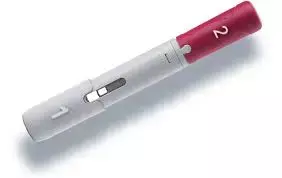- Home
- Medical news & Guidelines
- Anesthesiology
- Cardiology and CTVS
- Critical Care
- Dentistry
- Dermatology
- Diabetes and Endocrinology
- ENT
- Gastroenterology
- Medicine
- Nephrology
- Neurology
- Obstretics-Gynaecology
- Oncology
- Ophthalmology
- Orthopaedics
- Pediatrics-Neonatology
- Psychiatry
- Pulmonology
- Radiology
- Surgery
- Urology
- Laboratory Medicine
- Diet
- Nursing
- Paramedical
- Physiotherapy
- Health news
- Fact Check
- Bone Health Fact Check
- Brain Health Fact Check
- Cancer Related Fact Check
- Child Care Fact Check
- Dental and oral health fact check
- Diabetes and metabolic health fact check
- Diet and Nutrition Fact Check
- Eye and ENT Care Fact Check
- Fitness fact check
- Gut health fact check
- Heart health fact check
- Kidney health fact check
- Medical education fact check
- Men's health fact check
- Respiratory fact check
- Skin and hair care fact check
- Vaccine and Immunization fact check
- Women's health fact check
- AYUSH
- State News
- Andaman and Nicobar Islands
- Andhra Pradesh
- Arunachal Pradesh
- Assam
- Bihar
- Chandigarh
- Chattisgarh
- Dadra and Nagar Haveli
- Daman and Diu
- Delhi
- Goa
- Gujarat
- Haryana
- Himachal Pradesh
- Jammu & Kashmir
- Jharkhand
- Karnataka
- Kerala
- Ladakh
- Lakshadweep
- Madhya Pradesh
- Maharashtra
- Manipur
- Meghalaya
- Mizoram
- Nagaland
- Odisha
- Puducherry
- Punjab
- Rajasthan
- Sikkim
- Tamil Nadu
- Telangana
- Tripura
- Uttar Pradesh
- Uttrakhand
- West Bengal
- Medical Education
- Industry
Adalimumab use in RA not linked to increased MACE and VTE compared to JAK inhibitors

Researchers have found in a new study that risks for major adverse cardiac events and venous thromboembolism in patients with rheumatoid arthritis did not significantly differ between those receiving Janus kinase inhibitors or adalimumab.
A study was conducted to assess the risk of major adverse cardiovascular events (MACEs) and venous thromboembolism events (VTEs) among patients initiating a Janus kinase inhibitor (JAKi) (tofacitinib and baricitinib) versus adalimumab in a large real-world population of patients with rheumatoid arthritis.
The researchers conducted a nationwide population-based cohort study of the French national health data system, the exposed group initiating a JAKi and non-exposed group initiating adalimumab. We included all individuals who had their first dispensation of a JAKi or adalimumab between 1 July 2017 and 31 May 2021 and had rheumatoid arthritis. The primary endpoints were the occurrence of a MACE or VTE. Weighted hazard ratio (HRw) values were estimated with the inverse probability of treatment weighting method to account for confounding factors with concomitant administration of methotrexate as a time-varying variable.
Results:
- The cohort included 15 835 patients: 8481 and 7354 in the exposed and non-exposed groups
- During follow-up, 54 and 35 MACEs and 75 and 32 VTEs occurred in the exposed and non-exposed groups, respectively.
- Risk of MACEs for the exposed versus non-exposed group was not significant: HRw 1.0
- Despite a lack of power, results were consistent among patients aged 65 years or older with at least one cardiovascular risk factor.
This study provides reassuring data regarding the risks of MACEs and VTEs in patients initiating a JAKi versus adalimumab, including patients at high risk of cardiovascular diseases.
Reference:
Lea Hoisnard, et al. Risk of major adverse cardiovascular and venous thromboembolism events in patients with rheumatoid arthritis exposed to JAK inhibitors versus adalimumab: a nationwide cohort study. 2022;doi:10.1136/ard-2022-222824.
Dr. Shravani Dali has completed her BDS from Pravara institute of medical sciences, loni. Following which she extensively worked in the healthcare sector for 2+ years. She has been actively involved in writing blogs in field of health and wellness. Currently she is pursuing her Masters of public health-health administration from Tata institute of social sciences. She can be contacted at editorial@medicaldialogues.in.
Dr Kamal Kant Kohli-MBBS, DTCD- a chest specialist with more than 30 years of practice and a flair for writing clinical articles, Dr Kamal Kant Kohli joined Medical Dialogues as a Chief Editor of Medical News. Besides writing articles, as an editor, he proofreads and verifies all the medical content published on Medical Dialogues including those coming from journals, studies,medical conferences,guidelines etc. Email: drkohli@medicaldialogues.in. Contact no. 011-43720751


